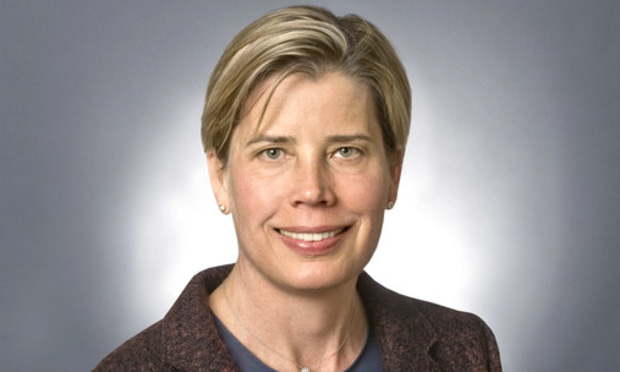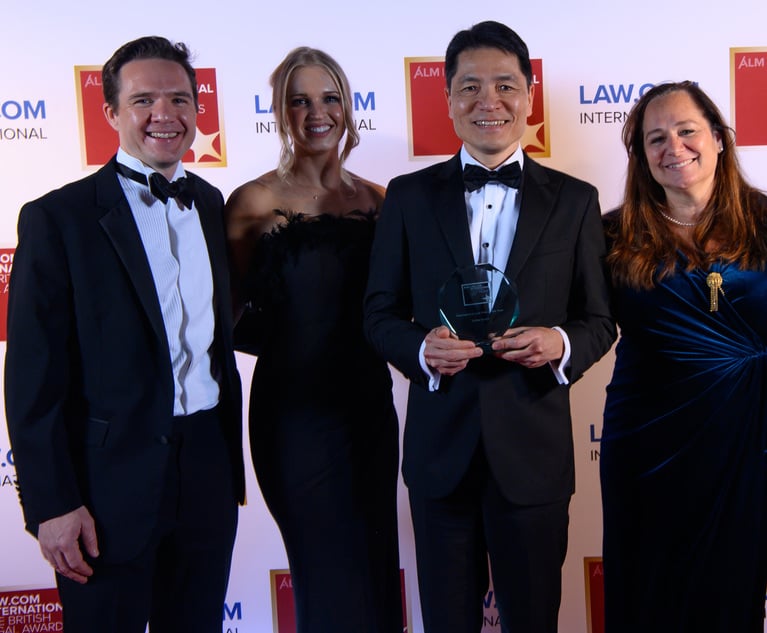Former MoFo Managing Partner Anna Erickson White on Overcoming Gender Issues
In a Q&A, she opens up about support systems and keeping an eye on the long-term outlook.
March 12, 2018 at 06:00 PM
8 minute read

Editor's note: This is part of a series of Q&As with leading women in the legal profession, in honor of National Women's History Month. They were conducted and written by the legal recruiting firm Major, Lindsey & Africa.
Anna Erickson White, a securities litigation partner, has spent her entire career at Morrison Foerster, starting there as a summer associate in 1991. From early on, she was involved in different firm committees; she was the associate representative of the Palo Alto, California, office, managed the summer associates for two years and shortly after becoming a partner in 2000, sat on the firmwide associate evaluation committee and was the head of litigation in Palo Alto. “I enjoyed those opportunities because it gave me a broad perspective of the firm and introduced me to the different people and practices in the firm,” she says. She served as MoFo's firmwide managing partner twice, from 2006–09 and 2012–15. Currently, she is on the firm's executive committee and board of directors and works in the San Francisco office.
Who helped you the most on your career path?
I was lucky; I started in the Palo Alto office, which was about 100 attorneys at that time, and was led by AC Johnston, a long-time Morrison partner who retired at end of 2016. AC is a prince. He set the tone of the ligation group in that office: Work hard and produce excellent work product, treat your colleagues with respect and have fun. AC was also an important mentor to me because he was always encouraging and a big advocate for supporting and promoting women. He gave me a significant amount of opportunities and set a really good example of how I wanted to be as a lawyer and partner.
Were there any moments early in your career that surprised you in terms of how you were treated? What struggles did you encounter and how did you overcome those roadblocks in your career?
As an associate, I honestly didn't have many struggles related to being a woman; my colleagues were very supportive of my work and me. I had my first daughter in my second year and my second daughter after I was elevated to partnership. Although we didn't have a part-time policy at the time (and I had few, if any, women role models), the partners and associates I worked with were flexible with my schedule so that I could balance raising my daughters and working. We now, of course, have a great part-time policy available to our lawyers. To this day, I am grateful for my colleagues' support, and it has engendered a lot of loyalty from me. Many of my colleagues remain like family to my daughters.
All that said, there were times, of course, when gender issues would pop up. For example, after I came back from my first maternity leave, I was working with a male partner and my good male friend joined the case. Once my friend joined, the two of them would start talking about sports when we were together. Since I wasn't interested in sports at the time, I started feeling at a disadvantage and isolated. I talked to my friend about it and we reached a compromise: He couldn't talk about sports when we were all together and I couldn't talk about kids. It worked for us (and, of course, we had fun enforcing our deal).
What I learned from experiences like that was the importance of communication. As a seventh-year associate, the year I was up for partner, I was working on a matter that was going to trial within a matter of months. My older daughter was five at the time and I was pregnant with my younger daughter when the firm asked me to go to Japan for two weeks to take depositions. I'd been traveling a lot and it was taking a toll on my daughter and me. I told the firm I wanted to go but would like to take my daughter with me and they said it was fine. What's most telling about that experience is that I felt that I could make that request and that it would not (negatively) affect my partnership prospects.
What was your greatest challenge as the firmwide managing partner of Morrison Foerster? What keeps you up at night?
The things I worry about the most are the pressures on law firms in terms of showing annual growth in profits. That's important in a competitive market, but I worry it can be at the cost of having a long-term focus in a profession with a long tail (meaning it can take a long time for people to build their careers and a client base). Over the last five years or so, we've made it a priority to build for the long term by giving opportunities to younger talent at our firm, in both the leadership and practice ranks. It's made a difference and will be the gift that keeps on giving.
How important is it to your law firm to have women in leadership?
Very. The advancement of women in our firm and the legal profession is extremely important to us. I'm proud of what we've done over the last decade or so. When I started, I was one of the few women in leadership positions in the firm. There were two female managing partners before me, but there hadn't been many females in leadership on the practice group side. We've really pushed to have women as leaders in practice groups and as department chairs. It's made a big difference. As there are fewer women in our partnership, it's required, at times, to ask these women who take on leadership roles to stretch themselves. They do it and they excel.
How do you or your organization help women advance in the workplace and the legal profession?
We host a women's summit every 18 months, rotating between San Francisco and New York. We invite our female clients and put on a day-long program to discuss issues in various areas of the law as well as law firm practice. It helps our female attorneys and our in-house counterparts to improve their reputations and build connections. It's been a huge success.
Internally, my big focus last year was on recruiting more outstanding women lawyers to our already outstanding team. I personally spent a lot of time last year searching for and recruiting women securities litigation attorneys. I am very happy to say we added four women to our team last year. The more women on the team, the easier it is to retain and recruit other talented women.
What advice would you give to young lawyers who desire to become a partner in a law firm?
Develop personal relationships with the people you work with, which requires effort on your part. Do not be shy about asking to go to lunch or stopping by someone's office and asking for feedback or just to talk about an assignment (instead of doing it over email). Those things were really important to my career because people got to know and trust me, and it made difficult conversations easier. That's a huge piece of building a career regardless of whether you want to make partner. But it takes work, so associates need to be conscious of that and not assume partners are going to take the lead. Yes, partners have lots to do, but they will usually be pleased to be asked.
Don't underestimate the importance of a good support system. That means taking the time to develop friendships with the people you work with.
Do great work and make sure you give yourself time to do it. Be realistic, though, about how much you can take on. Make sure you can deliver quality work—and then let it shine.
Build and maintain professional relationships outside the firm from your first days as a lawyer. These relationships may not seem like they will pay off immediately, but they will soon enough.
Take opportunities even if they scare you. Stretch. Don't be afraid to ask for help to prepare for those opportunities. If it means taking on pro bono matters or speaking opportunities, do it. They will help you become a better lawyer. Show the people you are working with that you are interested in your own development.
Keep your eyes on the long game. For example, if you have kids or other things that take up time that you would otherwise be spending on work, embrace them and try not to get impatient. When you're ready, you'll get back in the game and those interruptions will have been beyond worth it.
Own the firm and try to improve it from early on. You can participate in so many things—recruiting, the summer program, taking new colleagues out to coffee or lunch or trying to improve law firm technologies, for example. Those are essential characteristics of a good partner, after all.
This content has been archived. It is available through our partners, LexisNexis® and Bloomberg Law.
To view this content, please continue to their sites.
Not a Lexis Subscriber?
Subscribe Now
Not a Bloomberg Law Subscriber?
Subscribe Now
NOT FOR REPRINT
© 2025 ALM Global, LLC, All Rights Reserved. Request academic re-use from www.copyright.com. All other uses, submit a request to [email protected]. For more information visit Asset & Logo Licensing.
You Might Like
View All
'Digital Mindset': Hogan Lovells' New Global Managing Partner for Digitalization

Quiet Retirement Meets Resounding Win: Quinn Emanuel Name Partner Kathleen Sullivan's Vimeo Victory
Can a Law Firm Institutionalize Its Culture? Boies Schiller’s New Chairman Will Try
Trending Stories
- 1Plaintiff Argues Jury's $22M Punitive Damages Finding Undermines J&J's Talc Trial Win
- 2Bannon's Fraud Trial Delayed One Week as New, 'More Aggressive,' Defense Attorneys Get Ready
- 3'AI-Generated' Case References? This African Law Firm Is Under Investigation
- 4John Deere Annual Meeting Offers Peek Into DEI Strife That Looms for Companies Nationwide
- 5Why Associates in This Growing Legal Market Are Leaving Their Firms
Who Got The Work
J. Brugh Lower of Gibbons has entered an appearance for industrial equipment supplier Devco Corporation in a pending trademark infringement lawsuit. The suit, accusing the defendant of selling knock-off Graco products, was filed Dec. 18 in New Jersey District Court by Rivkin Radler on behalf of Graco Inc. and Graco Minnesota. The case, assigned to U.S. District Judge Zahid N. Quraishi, is 3:24-cv-11294, Graco Inc. et al v. Devco Corporation.
Who Got The Work
Rebecca Maller-Stein and Kent A. Yalowitz of Arnold & Porter Kaye Scholer have entered their appearances for Hanaco Venture Capital and its executives, Lior Prosor and David Frankel, in a pending securities lawsuit. The action, filed on Dec. 24 in New York Southern District Court by Zell, Aron & Co. on behalf of Goldeneye Advisors, accuses the defendants of negligently and fraudulently managing the plaintiff's $1 million investment. The case, assigned to U.S. District Judge Vernon S. Broderick, is 1:24-cv-09918, Goldeneye Advisors, LLC v. Hanaco Venture Capital, Ltd. et al.
Who Got The Work
Attorneys from A&O Shearman has stepped in as defense counsel for Toronto-Dominion Bank and other defendants in a pending securities class action. The suit, filed Dec. 11 in New York Southern District Court by Bleichmar Fonti & Auld, accuses the defendants of concealing the bank's 'pervasive' deficiencies in regards to its compliance with the Bank Secrecy Act and the quality of its anti-money laundering controls. The case, assigned to U.S. District Judge Arun Subramanian, is 1:24-cv-09445, Gonzalez v. The Toronto-Dominion Bank et al.
Who Got The Work
Crown Castle International, a Pennsylvania company providing shared communications infrastructure, has turned to Luke D. Wolf of Gordon Rees Scully Mansukhani to fend off a pending breach-of-contract lawsuit. The court action, filed Nov. 25 in Michigan Eastern District Court by Hooper Hathaway PC on behalf of The Town Residences LLC, accuses Crown Castle of failing to transfer approximately $30,000 in utility payments from T-Mobile in breach of a roof-top lease and assignment agreement. The case, assigned to U.S. District Judge Susan K. Declercq, is 2:24-cv-13131, The Town Residences LLC v. T-Mobile US, Inc. et al.
Who Got The Work
Wilfred P. Coronato and Daniel M. Schwartz of McCarter & English have stepped in as defense counsel to Electrolux Home Products Inc. in a pending product liability lawsuit. The court action, filed Nov. 26 in New York Eastern District Court by Poulos Lopiccolo PC and Nagel Rice LLP on behalf of David Stern, alleges that the defendant's refrigerators’ drawers and shelving repeatedly break and fall apart within months after purchase. The case, assigned to U.S. District Judge Joan M. Azrack, is 2:24-cv-08204, Stern v. Electrolux Home Products, Inc.
Featured Firms
Law Offices of Gary Martin Hays & Associates, P.C.
(470) 294-1674
Law Offices of Mark E. Salomone
(857) 444-6468
Smith & Hassler
(713) 739-1250










